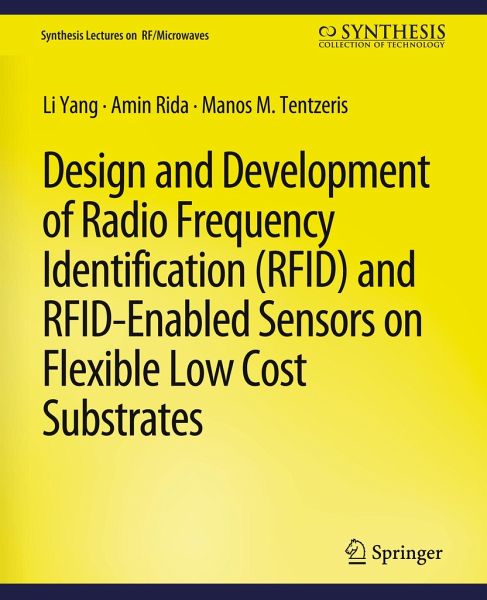
Design and Development of RFID and RFID-Enabled Sensors on Flexible Low Cost Substrates

PAYBACK Punkte
0 °P sammeln!
This book presents a step-by-step discussion of the design and development of radio frequency identification (RFID) and RFID-enabled sensors on flexible low cost substrates for UHF frequency bands. Various examples of fully function building blocks (design and fabrication of antennas, integration with ICs and microcontrollers, power sources, as well as inkjet-printing techniques) demonstrate the revolutionary effect of this approach in low cost RFID and RFID-enabled sensors fields. This approach could be easily extended to other microwave and wireless applications as well. The first chapter de...
This book presents a step-by-step discussion of the design and development of radio frequency identification (RFID) and RFID-enabled sensors on flexible low cost substrates for UHF frequency bands. Various examples of fully function building blocks (design and fabrication of antennas, integration with ICs and microcontrollers, power sources, as well as inkjet-printing techniques) demonstrate the revolutionary effect of this approach in low cost RFID and RFID-enabled sensors fields. This approach could be easily extended to other microwave and wireless applications as well. The first chapter describes the basic functionality and the physical and IT-related principles underlying RFID and sensors technology. Chapter two explains in detail inkjet-printing technology providing the characterization of the conductive ink, which consists of nano-silver-particles, while highlighting the importance of this technology as a fast and simple fabrication technique especially on flexible organicsubstrates such as Liquid Crystal Polymer (LCP) or paper-based substrates. Chapter three demonstrates several compact inkjet-printed UHF RFID antennas using antenna matching techniques to match IC's complex impedance as prototypes to provide the proof of concept of this technology. Chapter four discusses the benefits of using conformal magnetic material as a substrate for miniaturized high-frequency circuit applications. In addition, in Chapter five, the authors also touch up the state-of-the-art area of fully-integrated wireless sensor modules on organic substrates and show the first ever 2D sensor integration with an RFID tag module on paper, as well as the possibility of 3D multilayer paper-based RF/microwave structures.Table of Contents: Radio Frequency Identification Introduction / Flexible Organic Low Cost Substrates / Benchmarking RFID Prototypes on Organic Substrates / Conformal Magnetic Composite RFID Tags / Inkjet-Printed RFID-Enabled Sensors












